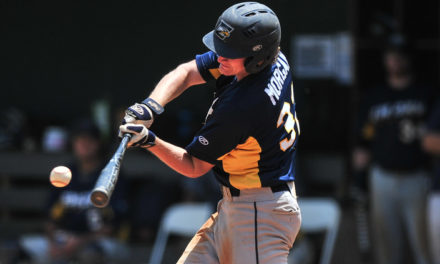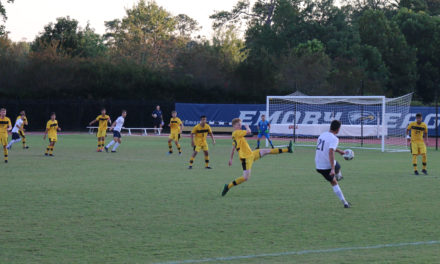Something extraordinary happened in Pittsburgh this baseball season. In the fifth and final game of the National League Division Series (NLDS), the Cardinals’ Adam Wainwright held the Pirates to one run to end Pittsburgh’s campaign this season. Although the Buccos’ drive to the World Series ended, the spirit of their fans did not. Instead it rose higher than ever and proved that the 2013 Pirates had captured the hearts of a city.
Growing up, my father and I averaged between 20 and 30 Pirates games a year. We cheered for the Buccos and hoped above the reality of their players stats that they’d win, though they seldom did. In fact, they set a consecutive losing season record for major North American leagues at 20, from 1993 until 2013. Being born in 1994, I hadn’t seen the Pirates finish higher than .500 once.
My dad and I always said, “This is the year.” We bought matching shirts that said “I Believe.” But year after year, we found ourselves heartbroken and angry at the team’s owners – Kevin McClatchy, then Robert Nutting. Stars who gave hope, most notably Brian Giles, Aramis RamÃrez, and Jason Bay, were traded not to make the team better but to cut the team’s salary. It has been said that teams like the Pirates were looked at by the players as another level of the minors – not really a Major League team but quad-A, in between AAA and the Majors. Players would hope to do well enough in Pittsburgh to get signed by real teams like the Yankees or Red Sox.
After the 2010 season, the Pirates hired Clint Hurdle as their new manager. Hurdle, a recovering alcoholic and former Major Leaguer who loves his team like family, was one of the catalysts who created a team the city could love. An ESPN article gives examples of emails Hurdle sends to his players, his players families, his family and his friends. They include motivational quotes and stories – something needed in a discouraged franchise. When the Pirates were a game out of first place, his email quoted Albert Einstein: “I never worry about the future. It comes soon enough.”
Hurdle might have believed in the Pirates, but the city surely didn’t start off on the same page. In Hurdle’s first two years, the team was above .500 at the All Star Break, then faltered and went on to finish in fourth place. One PNC Park diehard, Dr. Ed, as he is known by all the regular season ticket holders near the front row on the Pirate dugout, regularly sports his retro 1970s flat top, striped Pirate hat and incongruous 1960 jersey.
On special occasions, the physician wears a full Caribbean pirate costume. Days after the Pirates won a game giving them the best record in baseball, I told Dr. Ed I thought we might make it to the Series this year. “No, Zak!” he shouted out of a mouth filled with peanuts, shells and all. “I’m not getting my hopes up again.”
He had been heartbroken too many times. He was scared to believe. But Dr. Ed would soon see that this year was different. This year, the Pirates were a team worth the risk of opening your heart and allowing your hope to flow.
Andrew McCutchen, a standout player since his rookie year in 2009, exploded as a superstar in 2012, hitting .321 with 31 home runs. A “five-tool player,” both colorful and inspirational, “Cutch” emerged from the depths of poverty, wore dreadlocks halfway down his back and hustled on the field. And he was always laughing, having fun. It was hard, however, to love a player you assumed would leave the Pirates for more money after his three year contract was up. But in the offseason, McCutchen signed a six-year $51.5 million contract with the Pirates.
In an ESPN E:60 video, McCutchen said that in high school he wanted to be drafted by the Pirates, that “everything about Pittsburgh made him feel at home.” He said if he had looked for more money after his first contract expired, he would be contradicting his heart: he plays not for money but because he loves the game.
And the team was having fun. During the 2012 season, after watching the stoner flick “Dude, Where’s My Car?” they adopted the “Zoltan” sign to celebrate good hits and plays. In the movie, bubble wrap dressed Ashton Kutcher and Seann William Scott make a “Z” signal with their hands for the cult leader Zoltan.
The 2013 Pirates were a rowdy, colorful bunch of guys who loved playing the game. They were different from teams in years past, however, because they loved playing for Pittsburgh. They weren’t waiting for their promotion to a real MLB team. In the hallway in between the Pirates dugout and clubhouse, a sign quotes Roberto Clemente: “When I wear my uniform, I feel I am the proudest man on earth.”
And this year, Cutch and AJ, El Toro and Grilli, Marte and Walker, and all the others played like the proudest men on earth. At the same time, they weren’t arrogant. Neil Walker stressed in a post game interview mid-season that they were taking it game-by-game. Somewhere in this balance, they weren’t planning on an early end to the season. They wanted the World Series, and that was clear.
And the love and aspirations the Pirates had for the city allowed the city to love them back and believe in them. The Pirates ended the season in second place in the National League Central, taking one of the two wildcard spots with the Reds. This meant that the two teams would play a one-game playoff. The Pirates swept the Reds in their last three games of the season, meaning that the playoff game would be in Pittsburgh. On Twitter, Burnett and McCutchen called for a blackout at PNC Park in which more than 40,000 fans replaced their team color black and gold shirts with pure black shirts and waved black towels.
The Reds started fireballer Johnny Cueto, who had to leave the opening game of the NLDS in 2012 due to back spasms, and he was noticeably nervous from the start. When he was on the mound in Pittsburgh, the fans mockingly chanted “Cueto, Cueto,” nonstop. In the second inning, he dropped the ball then threw a fastball down the middle that Martin drove deep into the left-center stands. The Pirates won 6-2 and the city was in a state of pandemonium.
In the baseball classic, “The Boys of Summer”, sportswriter Roger Kahn describes growing up as a Brooklyn Dodgers fan when they weren’t winning. “You may glory in a team triumphant, but you fall in love with a team in defeat. Losing after great striving is the story of man, who was born to sorrow, whose sweetest songs tell of saddest thought, and who, if he is a hero, does nothing in life as becomingly as leaving it.”
I was so on edge for the final Game Five of the first round playoff, which the Pirates played in St. Louis, that I chose to watch it alone in my room with four views of the field on my computer. Wainwright out-pitched the young Gerrit Cole. The Pirates played well, but the Cardinals simply played better. The season-ending loss didn’t feel the way the previous season-ending games had, however. My hopes weren’t crushed. I didn’t resend the Pirates or even the Cardinals. It felt the way it felt when my high school team lost in semi-finals of the state tournament. It wasn’t the Pirates team that lost; it was Pirates Nation that lost. I wanted to console Cole. I wanted to thank the whole team for such a great year.
Twitter was bombarded with tweets from Pittsburgh that night. “Thanks for a great season #bucconation.” “We’ll get em next year guys #PittsburghPirates.” “Still the City of Champions.”
– By Zak Hudak
zak.hudak@emory.edu
The Emory Wheel was founded in 1919 and is currently the only independent, student-run newspaper of Emory University. The Wheel publishes weekly on Wednesdays during the academic year, except during University holidays and scheduled publication intermissions.
The Wheel is financially and editorially independent from the University. All of its content is generated by the Wheel’s more than 100 student staff members and contributing writers, and its printing costs are covered by profits from self-generated advertising sales.





congratulations for the beautiful text
como reconquistar http://www.outrachance.com.br/